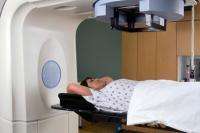Single-dose radiotherapy during surgery 'effective in preventing breast cancer return'

A single dose of targeted radiotherapy delivered during or just after surgery could benefit some women undergoing treatment for early breast cancer, two new European studies suggest.
Current treatments require women to attend daily radiotherapy sessions for weeks after surgery, while the new targeted approach requires only a single dose.
Cancer Research UK described the two trials as promising, but stressed that a longer period of follow-up would be needed to test if this new approach could truly benefit patients in the future.
Most women who require surgery to remove part of their breast - a procedure known as lumpectomy - also complete a course of external beam radiotherapy (EBRT) to reduce the risk of their cancer coming back.
EBRT is delivered to the whole of the affected breast but it can cause unpleasant side effects and requires patients to attend radiotherapy centres for between 20 and 30 days after surgery.
This can be problematic for women living far from radiotherapy centres, especially those in remote areas.
This has led different groups of researchers - including Cancer Research UK's Professor John Yarnold - to investigate different ways of giving radiotherapy.
One question being investigated is whether a single dose of radiation - specifically targeted to the site of the tumour and delivered during or soon after surgery - might offer a viable alternative treatment to reduce the risk of cancer coming back. The new studies looked at two different methods of delivering targeted radiation in this way, and are published in the Lancet and the Lancet Oncology.
The first looked at the effectiveness of targeted intra-operative radiotherapy (TARGIT), in which radiation is delivered to the tumour site via a miniature X-ray emitting device. The study was led by Professor Michael Baum and Professor Jayant Vaidya, of University College London.
Over a 12-year period, the team compared the performance of TARGIT with a standard EBRT course of daily radiotherapy doses for three to six weeks.
A total of 1,721 women received the TARGIT treatment compared with a control group of 1,730 women who received standard EBRT treatment.
The researchers focused on the five-year risk for breast cancer returning as a measure of success.
They specified if the difference in five-year risk between the two treatments was less than 2.5 per cent, then TARGIT should be considered as good as standard radiotherapy.
Across all trial participants, the difference in five-year risk for cancer returning in the breast was within the 2.5 per cent limit set by the researchers, meaning that a single TARGIT treatment was deemed as good as EBRT in controlling cancer.
Professor Vaidya said: "The most important benefit of TARGIT for a woman with breast cancer is that it allows her to complete her radiotherapy treatment at the time of her operation, with lower toxicity to the breast, the heart and other organs."
In the second study, researchers led by Professor Umberto Veronesi of the European Institute of Oncology in Milan looked at a slightly different method of delivering targeted radiation called electron intraoperative radiotherapy (ELIOT).
In the study, 651 women with early stage breast cancer received ELIOT during lumpectomy surgery, and a control group of 654 women received standard EBRT after lumpectomy.
After five years, more women in the ELIOT group had their breast cancer return compared to the control group.
But despite the different rates of breast cancer recurrence, there was not a significant difference in the proportion of women still alive after 5 years.
Professor Veronesi said: "Although our results show that five-year rates of local recurrence were significantly higher in women who received ELIOT, we need to bear in mind that, for some women, the benefits of not needing to complete weeks of radiotherapy will outweigh a higher risk of local recurrence."
Kate Law, director of clinical research at Cancer Research UK said: "Delivering radiotherapy in a single dose at the time of surgery potentially offers a huge benefit to patients, especially if it means fewer visits to hospital."
"It's now essential these women are followed up for a long period of time to ensure the single dose is as at least as effective as the standard treatment."
"Radiotherapy is already a very effective treatment, so improving that even further is an exciting prospect."
"It's important that innovative ways of treating cancer are explored so we can develop kinder ways of helping patients to beat the disease."

















